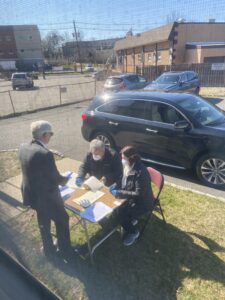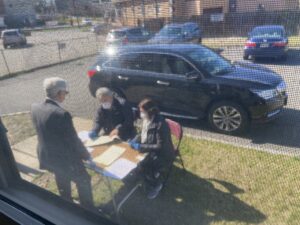Question: How to ensure that clients have an opportunity to sign their Last Wills and Testaments, Powers of Attorneys, Special Needs Trusts, Physician Orders for Life-Sustaining Treatment (POLST) forms, Advance Medical Directives and the myriad of other estate documents we typically prepare for clients during a coronavirus pandemic when social distancing is mandatory?
Answer: Conduct a drive-by signing. Several weeks ago, we held our first drive by signing of Wills, Powers of Attorneys (POAs) and Advance Medical Directives (AMDs) at our office, and we’ve conducted several drive-by signings since that time, all of which accomplished the goal of getting all estate documents signed at minimal risk to the clients and staff. The clients gave permission to post these photos demonstrating how we conducted our first drive-by signing.
The clients first tried to arrange to sign all their estate documents at their bank and other locations more convenient to their home that usually have a notary available, but could not do so due to the coronavirus situation.
The clients involved in the first drive-by signing are parents of a disabled son who is currently working at Walmart’s in New Jersey and is eligible for the Workability Medicaid program. NJ Workability offers people with disabilities who are working, and whose income would otherwise make them ineligible for Medicaid, the opportunity to receive full Medicaid coverage. The parents were concerned about getting the virus from their son and perhaps leaving him behind after they died without providing him with the protection of the special needs trusts which we drafted in their Last Wills and Testaments. Special Needs Trusts (SNTs) are a type of trust for disabled people that preserves the SNT beneficiary’s eligibility for needs-based government benefits such as Medicaid and Supplemental Security Income (SSI) while providing a fund that can be used to help improve the disabled beneficiary’s quality of life. As a result of these concerns, signing the wills, POAs and AMDs was very important to the clients.
In order to prepare for the drive by signing, I sent draft copies of all estate documents to the clients for their review prior to the signing ceremony. Then, I reviewed all estate documents to be signed with the clients via a phone conference in advance of the signing. I also told the clients about the procedure we would follow at the signing ceremony.
On the day of the signing ceremony, I met the clients in our law firm’s parking lot. In each drive by signing we’ve conducted, the clients stayed in or close to their car. My paralegals and I, as well the witnesses, wore gloves. Clients brought her own pens and took them home with them. Both clients wore masks.
Witnesses are required to ensure the validity of estate documents, and personnel from our firm served as witnesses while I served as the notary public. In New Jersey, licensed attorneys are permitted to notarize documents, including estate documents. In this case, the witnesses observed from an open window in our office, close enough to hear the questions I asked the clients in advance of the signing but far enough away to be safe. After the clients signed all documents, the staff signed as witnesses. I signed all documents as notary. Then, I brought the documents into the office, and the staff made copies of all documents in the office while still wearing their gloves. Clients took the original estate documents with them when they left the office. Clients were also sent a scan of the signed estate documents via email.
The clients appreciated the effort made by the staff. They recently provided a positive evaluation of our law firm, and ended with a genuine “thank you.” The evaluation provides as follows:
Did the firm do something especially well which pleased you? Yes, they accommodated us during [the] pandemic and we were able to sign documents outside with proper masks [and] gloves. Thank you!
The evaluation provided by the clients appears as a featured image in the blog post, above.
For additional information concerning estate planning and administration, visit:


